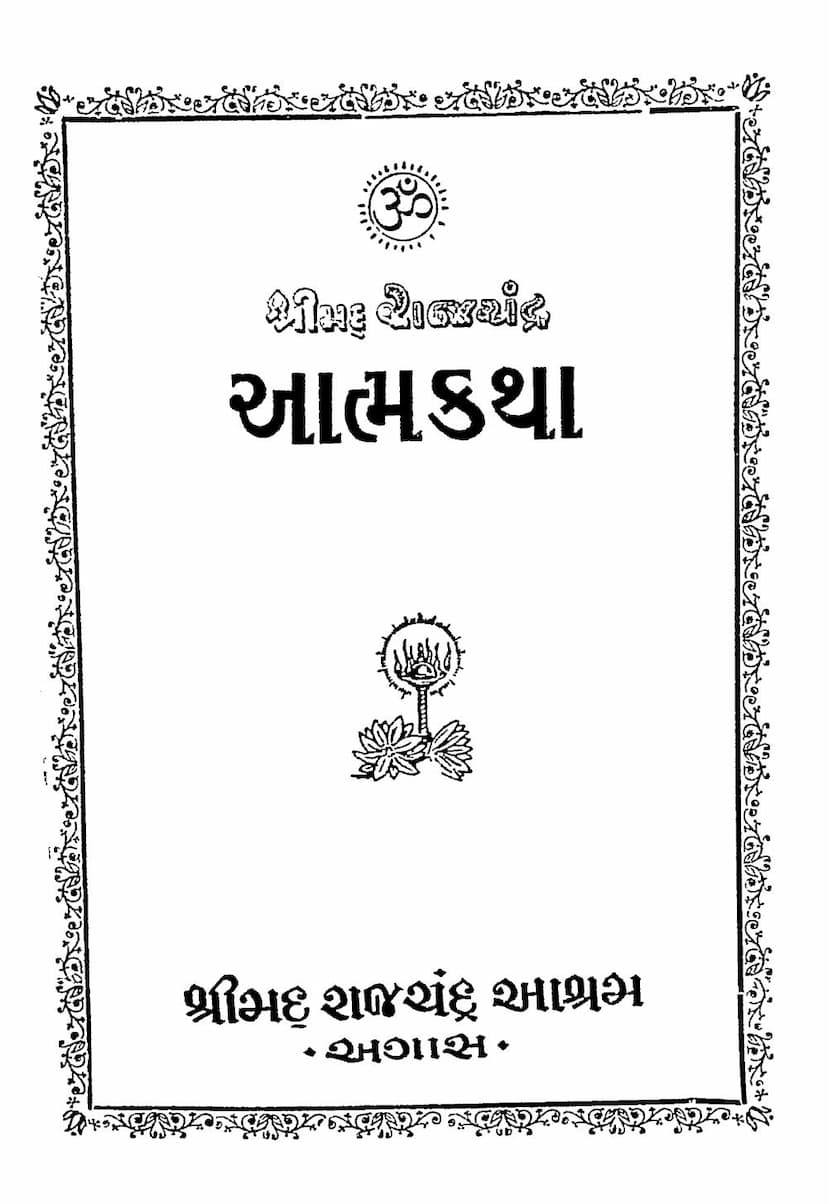Shrimad Rajchandra Atmakatha
Added to library: September 2, 2025

Summary
This document appears to be the Gujarati text of an autobiographical work by Shrimad Rajchandra, titled "Shrimad Rajchandra Atmakatha" (Shrimad Rajchandra's Autobiography). Published by Shrimad Rajchandra Ashram, Agas, it is a collection of the spiritual leader's thoughts, experiences, and reflections on his inner journey.
Here's a summary of the key themes and content, based on the provided pages and the table of contents (which seems to be listed at the end):
Core Themes:
- Spiritual Journey and Self-Realization: The central theme is Shrimad Rajchandra's profound inner spiritual journey, his quest for self-realization, and his profound understanding of the soul's nature.
- Detachment and Renunciation: A recurring theme is his evolving detachment from worldly possessions, relationships, and sensory pleasures, leading towards renunciation and inner peace.
- Vairagya (Dispassion) and Detachment: The text extensively explores his development of vairagya, a state of dispassion and indifference towards worldly matters, seeing them as transient and ultimately leading to suffering.
- Yearning for Moksha (Liberation): His deep desire for liberation from the cycle of birth and death, and his constant striving towards spiritual freedom, are evident throughout the text.
- The Nature of the Soul and Reality: Shrimad Rajchandra delves into the philosophical aspects of Jainism, discussing the nature of the soul (Atman), consciousness, karma, and the ultimate reality.
- The Struggle with Worldly Attachments and Inner Conflicts: Despite his spiritual progress, the text candidly portrays the internal struggles he faced, the pull of worldly affairs, and the effort required to maintain spiritual focus.
- The Role of Divine Grace and Effort: He often reflects on the interplay between divine will (Ishwarichha) and personal effort (Purusharth) in achieving spiritual goals.
- The Importance of Satsang (Good Company) and Guidance: The text highlights the value he placed on spiritual company and the guidance received from enlightened beings.
- The Nature of the Kali Yuga (The Current Age): He frequently laments the spiritual decline and moral decay prevalent in the current age, which makes the spiritual path even more challenging.
- The Search for True Knowledge and Wisdom: The autobiography details his relentless pursuit of true knowledge, distinguishing it from mere intellectual understanding.
Content Breakdown (Based on Table of Contents and likely chapter themes):
The table of contents suggests a chronological and thematic progression through his life and spiritual development. The entries (though numbered inconsistently in the provided text) touch upon:
- Early Life and Intellectual Development: His early years, his sharp intellect, his philosophical inquiries even at a young age, and his engagement with various thoughts and ideas.
- Spiritual Awakening and Realization: The emergence of his spiritual consciousness, the insights gained, and the gradual unfolding of his inner realization.
- Experiences with Different States of Consciousness: Descriptions of various spiritual states, the challenges in maintaining them, and the ongoing process of purification.
- Reflections on Relationships and Family: His perspective on his family, his detachment from them, and his ultimate spiritual focus transcending worldly ties.
- Business and Worldly Conduct: How he navigated his business dealings while maintaining his spiritual integrity and detachment.
- Philosophical and Theological Discussions: His deep dives into Jain philosophy, discussing concepts like karma, liberation, the soul, and the nature of the universe.
- Inner Turmoil and Peace: The constant interplay between worldly distractions and his inner yearning for peace, and the strategies employed to overcome them.
- The Role of Devotion and Surrender: His devotion to the Divine and his ultimate surrender to a higher power.
- The Importance of the Present Moment and Detachment: His emphasis on living in the present moment with detachment from past and future.
- Experiences with Asceticism and Austerities: While not explicitly detailed as a primary focus, the underlying spirit of austerity and self-discipline is present.
- The Nature of True Happiness and Suffering: His insights into the illusory nature of worldly happiness and the true nature of suffering.
- The Ideal Spiritual Life: His aspirations for a life of complete detachment, equanimity, and spiritual realization.
- Personal Struggles and Victories: Candid accounts of his personal battles with desires, temptations, and the eventual overcoming of these obstacles through spiritual strength.
- Guidance to Aspirants: Throughout the text, there are implicit and explicit pieces of advice and guidance for those on the spiritual path.
Overall Impression:
Shrimad Rajchandra Atmakatha appears to be a deeply introspective and spiritually rich autobiography. It offers a candid glimpse into the profound inner world of a realized soul, detailing his journey of transformation, his intellectual and spiritual prowess, and his unwavering commitment to the highest spiritual ideals of Jainism. The text seems to be a testament to the power of self-discipline, unwavering faith, and the relentless pursuit of truth and liberation.